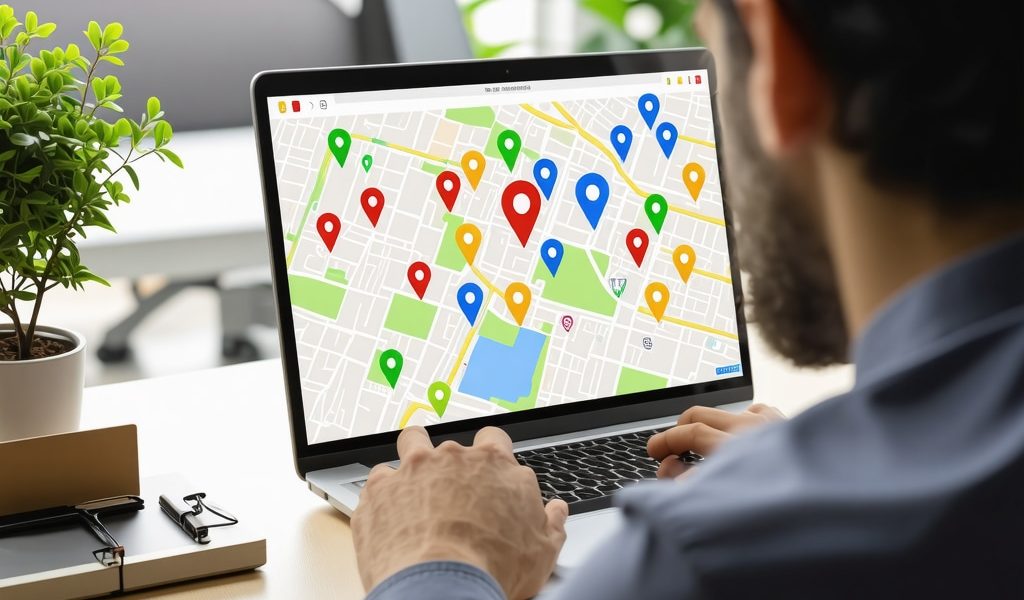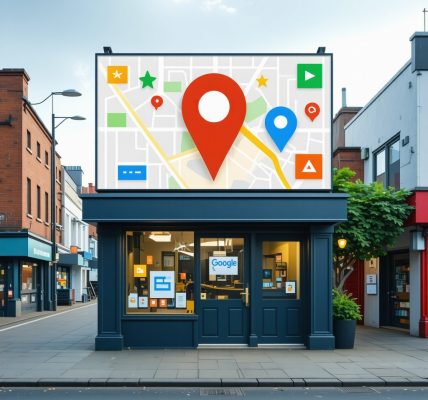Unlocking the Power of Your Google Business Profile
In today’s fiercely competitive local marketplace, mastering Google Business optimization is not just an option—it’s an imperative. Local SEO shapes how potential customers discover your business through Google Search and Maps, making your Google Business Profile the digital storefront that beckons or repels visitors. This expert guide unravels the most pressing local SEO FAQs, empowering you to elevate your presence and convert local searches into loyal customers.
Strategic Foundations: What Makes Google Business Optimization So Crucial?
Google Business optimization directly influences local search rankings by signaling to Google and users that your business is relevant, credible, and accessible. Unlike traditional SEO, it leverages hyperlocal signals such as proximity, reviews, and citations to secure a coveted spot in the Local 3-Pack. Properly optimized profiles dramatically increase visibility, foot traffic, and lead generation, especially for small enterprises competing against regional giants.
Decoding Local SEO Nuances Through Practical Scenarios
Consider a neighborhood coffee shop struggling to attract morning customers. By meticulously updating their Google Business Profile with accurate hours, professional photos, and engaging posts, they not only increased user engagement but also enhanced their local ranking. This real-world example illustrates how tailored content and consistent NAP (Name, Address, Phone number) citations across platforms can transform local digital visibility.
How Do Google Reviews Influence My Local SEO and Customer Trust?
Google reviews serve a dual purpose: they act as social proof enhancing your business’s trustworthiness, and they feed into Google’s local ranking algorithms. The volume, velocity, and sentiment of reviews can significantly sway your position in local search results. Encouraging authentic, positive reviews while promptly addressing negative feedback reflects both SEO savvy and customer-centric professionalism—key to sustainable local growth.
Harnessing Advanced Tactics: Beyond Basic Profile Setup
Beyond the fundamentals, leveraging Google Business features like Q&A, service menus, and booking integrations can create richer user experiences and higher engagement rates. Additionally, managing local citations with precision, including consistency in formatting and authoritative directory submissions, reinforces your local SEO strategy. Employing geo-targeted keywords within your profile descriptions and posts further aligns your business with localized search intent.
Integrating Authoritative Insights and Tools for Continuous Growth
Top experts recommend regular audits to identify optimization gaps and track performance metrics such as search queries, views, and customer actions directly from Google Business Insights. Utilizing specialized tools like BrightLocal or Moz Local can automate citation management and review monitoring, making the optimization process scalable and data-driven.
For a deep dive into mastering Google Business SEO, explore the comprehensive guide at Mastering Google Business SEO: Your Complete Guide.
Ready to amplify your local search impact? Share your experiences or questions in the comments below and connect with a community dedicated to local SEO excellence.
Maximizing Google Business Profile Features for Local SEO Excellence
To truly dominate local search results, experts recommend going beyond the basics of Google Business Profile optimization. Leveraging advanced features such as Google Posts, Q&A, and booking integrations enables businesses to engage users directly within the search interface, increasing click-through rates and conversions. For instance, timely Google Posts highlighting promotions or events can drive immediate customer action while signaling to Google that your profile is actively maintained.
Similarly, the Q&A section serves as a vital touchpoint for preemptively addressing common customer inquiries, reducing friction in the buyer journey. Businesses that monitor and respond to questions quickly foster trust and relevance, which Google rewards with higher local rankings. Integrating booking or appointment capabilities directly within your profile streamlines the customer experience and can significantly increase lead generation.
Implementing Structured Data and Local Schema Markup for Enhanced Visibility
Advanced local SEO strategies also involve the use of structured data and schema markup on your business website. Implementing LocalBusiness schema helps search engines better understand your business details, such as address, hours, and services offered. This semantic clarity can enhance your Google Business Profile’s search presence by enriching search snippets with vital information like ratings, pricing, and availability.
Moreover, consistent NAP (Name, Address, Phone number) data across your Google Business Profile and website schema markup reduces confusion for both users and search engines, reinforcing your local authority. Businesses that diligently apply these technical SEO best practices often experience improved rankings and higher-quality traffic.
What Are the Most Impactful Metrics to Monitor for Continuous GMB Optimization?
Understanding which metrics to track is crucial for refining your Google Business Profile strategy. Key performance indicators include search queries that lead users to your profile, the number of profile views, customer actions such as calls or website visits, and direction requests. Monitoring the velocity and sentiment of customer reviews also provides insight into brand reputation and engagement trends.
Google Business Insights offers an in-depth analytics dashboard that allows businesses to interpret these metrics and adjust their SEO tactics accordingly. For example, if data shows a high volume of direction requests from a particular neighborhood, tailoring posts or offers to that area can yield better results. Combining these insights with tools like BrightLocal ensures a data-driven approach to local SEO success.
According to Moz, businesses that actively manage and respond to reviews and maintain accurate business information see a significant uplift in local search rankings and customer trust (Moz Local SEO Guide).
For more expert strategies on managing citations and boosting your local visibility, consider exploring our how to manage GMB citations for higher local visibility guide.
Have you tested any advanced Google Business Profile features or analytics tools? Share your experiences or questions in the comments to help fellow local SEO professionals thrive.
Harnessing Geo-Targeted Content Within Your Google Business Profile to Capture Hyperlocal Audiences
In the evolving landscape of local SEO, geo-targeting has emerged as a nuanced tactic that allows businesses to tailor their Google Business Profile content to resonate deeply with specific neighborhoods, districts, or micro-markets. By integrating localized keywords, neighborhood-specific events, and community-centric messaging, your profile not only aligns with user intent but also signals to Google’s algorithm a heightened relevance to precise geographic queries.
For example, a boutique gym in Brooklyn might incorporate references to “Williamsburg fitness classes” or “Greenpoint personal training” within their description and posts. This specificity drives higher engagement from users searching for services within these exact vicinities, increasing the likelihood of featuring prominently in localized search packs.
However, geo-targeting requires meticulous research to avoid keyword stuffing or irrelevant mentions that could dilute your profile’s authority. Employing tools like Google Trends and specialized local SEO platforms can help identify viable hyperlocal keywords that carry sufficient search volume without excessive competition.
How Can Deep Review Sentiment Analysis Elevate Your Google Business Profile Beyond Basic Reputation Management?
While managing Google reviews is standard practice, advanced sentiment analysis transforms raw feedback into actionable insights. By leveraging Natural Language Processing (NLP) tools, businesses can categorize reviews beyond star ratings—identifying recurring themes, customer pain points, and service strengths.
This granular understanding enables targeted improvements, personalized responses, and strategic marketing pivots. For instance, if sentiment analysis reveals frequent praise for your staff’s friendliness but concerns about wait times, you can respond proactively and adjust operations accordingly, enhancing customer satisfaction and signaling responsiveness to Google’s ranking algorithms.
Platforms like Lexalytics offer sophisticated sentiment analysis solutions tailored for local businesses, facilitating this depth of review intelligence.
Implementing Multi-Dimensional Schema Markup: Beyond LocalBusiness to Service and Product-Specific Schemas
Advanced local SEO demands a multi-layered schema strategy that extends beyond the foundational LocalBusiness markup. Incorporating schemas such as Service, Product, Offer, and Event enriches your website’s semantic structure, allowing search engines to parse and display detailed, context-rich snippets.
For instance, a restaurant can implement Menu and Event schemas to showcase special offerings and upcoming tastings or live music nights directly within SERPs. This enhanced presentation not only boosts click-through rates but also reinforces your Google Business Profile’s relevance and authority.
Ensuring consistency between your website’s schema data and your Google Business Profile information is critical to avoid conflicting signals that could impair local rankings. Utilizing Google’s Structured Data Testing Tool validates your implementation, catching errors before they impact SEO.
According to Google Developers documentation, comprehensive schema markup directly contributes to richer search results and improved user engagement.
Have you experimented with multi-dimensional schema markup or employed sentiment analysis for your Google reviews? Dive deeper into these expert techniques and share your insights or challenges in the comments to foster a community of local SEO mastery.
Revolutionizing Local SEO: Integrating AI-Powered Review Sentiment Tools
In the competitive arena of local search, leveraging artificial intelligence to analyze Google reviews transcends traditional reputation management. AI-driven sentiment analysis dissects nuanced emotional tones and recurring themes within customer feedback, providing a multidimensional perspective on your business’s strengths and vulnerabilities. This empowers local enterprises to implement data-backed refinements that resonate authentically with their audience, fostering not only enhanced customer satisfaction but also signaling robust engagement metrics to Google’s ranking algorithms.
How Can AI-Powered Sentiment Analysis Transform Your Local SEO Strategy?
By moving beyond star ratings, AI tools like Lexalytics enable businesses to categorize feedback, identify emerging trends, and prioritize operational adjustments. For instance, detecting a surge in negative sentiment regarding wait times allows for prompt intervention, while recurrent praise for specific services can be highlighted in marketing collateral and Google Posts. This strategic responsiveness not only nurtures trust among prospective customers but also enhances your Google Business Profile’s authority and relevance within local search results.
Expanding Schema Markup Horizons: Multi-Dimensional and Contextual Implementations
Elevating your website’s structured data strategy requires a sophisticated adoption of multi-dimensional schema markup that extends beyond basic LocalBusiness schema. Incorporating detailed schemas such as Service, Product, Offer, and Event enriches your semantic footprint, enabling search engines to present dynamic, information-rich snippets that capture user attention.
For example, embedding Event schemas for upcoming workshops or Offer schemas for exclusive promotions can amplify click-through rates and local engagement. Ensuring schema accuracy and consistency between your website and Google Business Profile mitigates conflicting signals, which is paramount for maintaining or improving your local search rankings. Utilize tools like Google’s Structured Data Testing Tool and the Rich Results Test to validate your markup integrity.
Harnessing Authoritative Expertise for Structured Data Excellence
Google Developers’ extensive documentation on LocalBusiness structured data offers invaluable insights into best practices and schema implementation nuances. Staying abreast of these guidelines ensures your website remains compliant with evolving search engine standards, fostering sustainable visibility gains.
Engage with these advanced optimization techniques and share your experiences or inquiries in the comments to contribute to a vibrant community of local SEO experts.
Frequently Asked Questions (FAQ)
What is the difference between a Google Business Profile and traditional SEO?
While traditional SEO focuses on optimizing a website for broad search engine rankings, Google Business Profile optimization zeroes in on local search visibility, leveraging hyperlocal signals such as proximity, reviews, and citations. It directly impacts how your business appears in Google Search and Maps, especially within the Local 3-Pack, making it indispensable for businesses targeting local customers.
How do customer reviews on Google influence my local search rankings?
Google reviews act as both social proof and ranking signals. The quantity, frequency, and sentiment of reviews affect your profile’s trustworthiness and relevance to local queries. Positive, authentic reviews increase click-through rates and customer trust, while timely responses to negative feedback demonstrate active engagement, both of which Google’s algorithm rewards.
Can integrating booking and appointment features within my Google Business Profile really boost conversions?
Yes. Embedding booking or appointment capabilities streamlines the user journey by allowing immediate action within the search interface. This reduces friction, increases lead generation, and signals to Google that your profile is actively maintained and user-friendly, which can improve local rankings and customer engagement.
Why is consistent NAP information across platforms critical for local SEO?
Consistency in Name, Address, and Phone number (NAP) across your Google Business Profile, website schema, and external citations prevents confusion for both users and search engines. It reinforces your business’s legitimacy and local relevance, which are key factors in Google’s ranking algorithm for local search.
How can geo-targeted content enhance my Google Business Profile’s performance?
Geo-targeted content tailored to specific neighborhoods or micro-markets aligns your profile with precise local search intent. Incorporating localized keywords and community-centric messaging increases relevance, engagement, and the likelihood of appearing in hyperlocal search results, thereby attracting the right audience.
What role does structured data and schema markup play in local SEO?
Structured data and schema markup provide search engines with detailed semantic information about your business, such as services, products, events, and offers. This enriches search snippets with valuable details like ratings and availability, improving click-through rates and reinforcing your Google Business Profile’s authority and visibility.
How does AI-powered review sentiment analysis improve my local SEO strategy?
AI-powered sentiment analysis goes beyond star ratings by extracting nuanced insights from reviews, identifying recurring themes and customer concerns. This enables targeted operational improvements, personalized responses, and strategic marketing, enhancing customer satisfaction and signaling strong engagement to Google’s ranking algorithms.
Which key metrics should I monitor to continuously optimize my Google Business Profile?
Focus on metrics such as search queries that lead to your profile, profile views, customer actions (calls, website clicks), direction requests, and review sentiment trends. Analyzing these data points through Google Business Insights and specialized tools allows for data-driven adjustments that improve local SEO performance.
Are multi-dimensional schema markups worth implementing beyond LocalBusiness schema?
Absolutely. Incorporating schemas like Service, Product, Offer, and Event enriches your website’s semantic structure, allowing search engines to display dynamic, context-rich snippets. This enhances user engagement, click-through rates, and supports your Google Business Profile’s relevance in local search results.
How often should I audit and update my Google Business Profile for optimal results?
Regular audits—ideally monthly or quarterly—are crucial to identify outdated information, monitor reviews, update posts, and refine geo-targeted content. Continuous maintenance ensures your profile remains accurate, relevant, and competitive in the ever-evolving local search landscape.
Trusted External Sources
- Google Developers – LocalBusiness Structured Data Documentation: Provides authoritative guidelines on implementing schema markup for businesses, essential for technical SEO best practices and enhancing local search visibility.
- Moz – Local SEO Guide: Offers in-depth analysis and strategies for managing Google Business Profiles, citations, and reviews, backed by data-driven insights from industry experts.
- BrightLocal – Local SEO Tools and Reports: Specialized in local SEO analytics, citation management, and review monitoring, BrightLocal equips businesses with actionable data to optimize their Google Business presence effectively.
- Lexalytics – AI-Powered Sentiment Analysis Platform: A leading provider of advanced natural language processing tools that help businesses extract meaningful insights from customer reviews to refine local SEO strategies.
- Google Trends: Essential for identifying hyperlocal and geo-targeted keyword opportunities, enabling businesses to tailor content that aligns with evolving user search intent.
Conclusion
Mastering Google Business Profile optimization is a multifaceted endeavor that blends accurate profile management, strategic use of advanced features, and technical enhancements such as structured data and schema markup. By integrating geo-targeted content and leveraging AI-powered review sentiment analysis, businesses can deepen local relevance and foster authentic customer engagement. Consistently monitoring key performance metrics and maintaining NAP consistency across platforms solidify your profile’s authority, boosting visibility within competitive local search landscapes.
These combined expert strategies empower businesses to transform their Google Business Profiles into dynamic, trust-building digital storefronts that attract and convert hyperlocal audiences. Begin implementing these advanced tactics today to elevate your local SEO performance and secure a competitive edge.
We invite you to share your experiences, questions, or advanced optimization techniques in the comments below. Explore more expert content to continuously refine your local SEO mastery and maximize your Google Business Profile’s impact.


